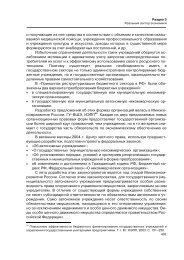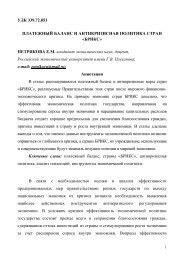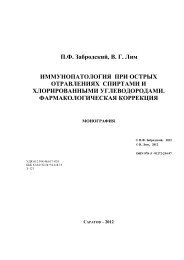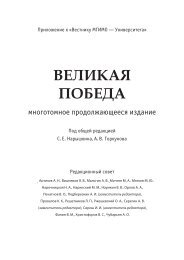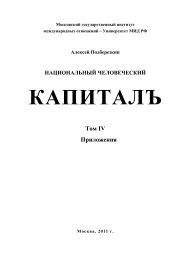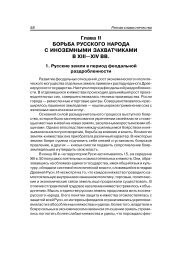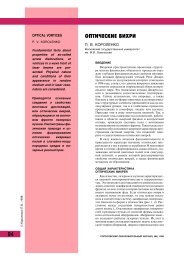Ensuring Strategic Stability in the Past and Present:
Ensuring Strategic Stability in the Past and Present:
Ensuring Strategic Stability in the Past and Present:
You also want an ePaper? Increase the reach of your titles
YUMPU automatically turns print PDFs into web optimized ePapers that Google loves.
<strong>Ensur<strong>in</strong>g</strong> that <strong>the</strong>re is no such gap is no easy task. It requires knowledge <strong>and</strong> skills applicable for<strong>the</strong> transformation of political (<strong>and</strong>, <strong>in</strong> certa<strong>in</strong> <strong>in</strong>stances, political-ideological) directives <strong>in</strong>toformulas for <strong>the</strong> development of concrete weapons <strong>and</strong> military hardware. This, <strong>in</strong> turn, requiresan underst<strong>and</strong><strong>in</strong>g of how <strong>the</strong> components of exist<strong>in</strong>g weapon systems will ensure <strong>the</strong> requiredqualities of <strong>the</strong>se systems—for example, <strong>the</strong> <strong>in</strong>vulnerability of a l<strong>and</strong>-based missile system. One of<strong>the</strong> complexities associated with this process is rooted <strong>in</strong> <strong>the</strong> fact that those who formulate politicaldirectives (<strong>and</strong> <strong>the</strong>y are often under <strong>the</strong> strong <strong>in</strong>fluence of ideologems) do not always clearlyunderst<strong>and</strong> <strong>the</strong> modern operative-strategic environment <strong>and</strong> <strong>the</strong> military-technical environment,<strong>and</strong> do not always have qualified experts <strong>and</strong> scientists at h<strong>and</strong> to advise <strong>the</strong>m.In this paper, <strong>the</strong> author outl<strong>in</strong>es his thoughts on a new configuration of <strong>the</strong> strategic nuclearforces of <strong>the</strong> Russian Federation that would feature certa<strong>in</strong> weapon systems <strong>and</strong> support systems.The author also once aga<strong>in</strong> br<strong>in</strong>gs up <strong>the</strong> issue of creat<strong>in</strong>g a system of “pre-nuclear deterrence” <strong>in</strong><strong>the</strong> Russian Federation.Nuclear weapons are an extremely important factor <strong>in</strong> ensur<strong>in</strong>g not only Russia’s national security,but also <strong>the</strong> country’s real sovereignty <strong>and</strong> its status as one of <strong>the</strong> world’s great powers. However,excessive reliance on <strong>the</strong>se weapons, <strong>in</strong>clud<strong>in</strong>g reliance at times of acute <strong>in</strong>ternational crises,would be counterproductive <strong>and</strong> even dangerous. Therefore, we must be as precise <strong>and</strong> realistic aspossible <strong>in</strong> def<strong>in</strong><strong>in</strong>g political, military-political <strong>and</strong> operational strategic objectives <strong>and</strong> targets—above all, when contemplat<strong>in</strong>g policy <strong>in</strong> <strong>the</strong> post-Soviet geographic space <strong>and</strong> adjacent regions.<strong>Strategic</strong> stability studies have been recently put on <strong>the</strong> back burner <strong>and</strong> moved below <strong>the</strong> radarscreen of <strong>the</strong> majority of political <strong>and</strong> military leaders, to say noth<strong>in</strong>g of <strong>the</strong> general public. Thehigh level of strategic stability reduces uncerta<strong>in</strong>ty <strong>in</strong> <strong>the</strong> relations of <strong>the</strong> correspond<strong>in</strong>g nuclearstates <strong>and</strong> enables political leaders of all ranks to focus on solutions of o<strong>the</strong>r problems that emerge<strong>in</strong> <strong>the</strong>ir countries or <strong>in</strong> <strong>the</strong> world as a whole. A high level of strategic stability also creates opportunitiesfor <strong>the</strong> democratization of <strong>in</strong>ter-state relations <strong>and</strong> of <strong>the</strong> overall global political system.As stated above, strategic stability is a complex <strong>in</strong>terdiscipl<strong>in</strong>ary subject that has <strong>in</strong>corporatedelements from <strong>the</strong> natural sciences <strong>and</strong> technical eng<strong>in</strong>eer<strong>in</strong>g. As a whole, however, it constitutesa subject of political science <strong>and</strong> political psychology, nei<strong>the</strong>r of which, unfortunately, has beensufficiently developed <strong>in</strong> Russia.The complex <strong>and</strong> multi-dimensional nature of this subject should not serve as an excuse for ignor<strong>in</strong>git. This subject ought to be studied by political leaders, state bureaucrats, military leaders,scientists <strong>and</strong> experts <strong>in</strong> various fields, to say noth<strong>in</strong>g of weapon designers <strong>in</strong> <strong>the</strong> defense <strong>in</strong>dustry,<strong>the</strong> scientific community, <strong>the</strong> M<strong>in</strong>istry of Defense <strong>and</strong> <strong>the</strong> Security Council of <strong>the</strong> RussianFederation.The maxim formulated by imperial Russian comm<strong>and</strong>er Alex<strong>and</strong>er Suvorov that “every soldiermust know his maneuver” can be applied to <strong>the</strong> task of ensur<strong>in</strong>g not only national security as awhole but also strategic stability <strong>in</strong> particular. Realization of this maxim requires <strong>the</strong> conscious,task-oriented efforts of thous<strong>and</strong>s <strong>and</strong> thous<strong>and</strong>s of people. Whe<strong>the</strong>r strategic stability is ensuredor underm<strong>in</strong>ed depends on whe<strong>the</strong>r <strong>the</strong> development of entire weapon systems, <strong>the</strong>ir <strong>in</strong>dividualcomponents, <strong>and</strong> <strong>the</strong>ir support systems is a success or a failure.Belfer Center for Science <strong>and</strong> International Affairs | Harvard Kennedy School 5



